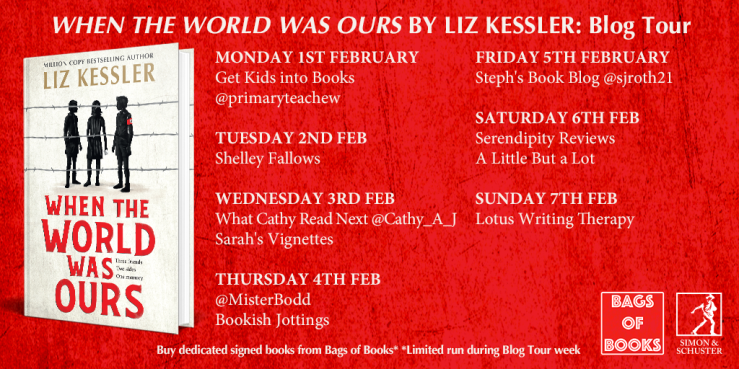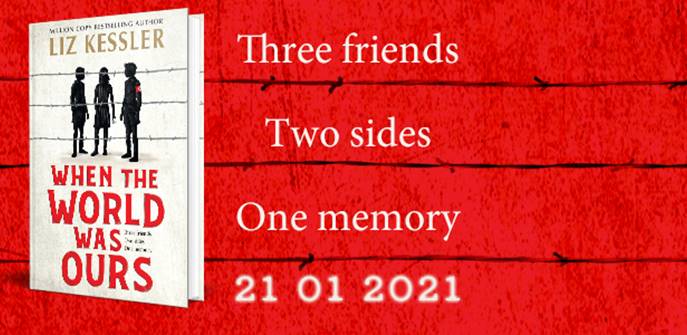
Welcome to today’s stop on the blog tour for When The World Was Ours by Liz Kessler. My thanks to Eve at Simon & Schuster for inviting me to take part in the tour and for my review copy. Do check out the post by my tour buddy for today, Sarah at Sarah’s Vignettes.
For the duration of the blog tour, you can purchase signed copies of When The World Was Ours from independent children’s bookshop, Bags of Books.
 About the Book
About the Book
Three friends. Two sides. One memory.
Vienna, 1936. Leo, Elsa and Max have been best friends for years. Since the day they met they’ve been a team of three. But then the Nazis come, and their lives, once so tightly woven together, take very different paths.
Leo must rely on the kindness of strangers to escape the rising threat to the Jewish people.
Elsa, like Leo, is hated for simply being who she is. To be safe, she must run.
Max suddenly finds that he is the danger his friends are trying so desperately to escape as his father rises through the Nazi ranks.
Format: Hardcover (320 pages) Publisher: Simon & Schuster
Publication date: 21st January 2021 Genre: Historical Fiction
Find When The World Was Ours on Goodreads
Purchase links
Bookshop.org
Disclosure: If you buy a book via the above link, I may earn a commission from Bookshop.org, whose fees support independent bookshops
Hive | Amazon UK
Links provided for convenience only, not as part of an affiliate programme
My Review
Inspired by the true story of her father’s escape from Nazi-occupied Europe, in When The World Was Ours the author takes the reader on a journey from Vienna in 1936 to the outbreak of the Second World War and beyond in the company of three childhood friends – Leo, Max and Elsa. Since Leo and Elsa are Jewish, the lives of the three children, and their families, are destined to take very different paths.
Given their youth, the friends don’t always understand, at least to begin with, the full import or implications of the things they see or hear their parents discussing. Only gradually do the youngsters become aware of the consequences of Leo and Elsa’s Jewish faith when anti-Jewish sentiment becomes more widespread and is followed by legal restrictions, and worse. It results in the three friends being separated, unsure if they will ever see one another again.
The author really captures the emotional and psychological toll of their experiences on the three children and the insidious nature of Nazi indoctrination. This is especially evident in the case of Max, who emerges as the most complex character and the only one of the three children whose thoughts are communicated in the third person. His mental contortions as he tries to reconcile what his conscience is telling him about his friends with the anti-Semitic hatred he is being fed by his father and the authorities is hard to witness. “Before long Max had convinced himself Leo and Elsa weren’t Jewish at all. They couldn’t have been. And if they weren’t Jewish then Max didn’t have a problem.”
Max’s fourteenth birthday evokes memories of an earlier birthday shared with Elsa and Leo – captured in a precious photograph – and a rare moment of self-awareness. “In an instant, nothing of his current life was real. He saw it for what it was: a vain, superficial attempt to fit in. To be loved. To be praised by his father…”. Unfortunately, it’s short-lived thanks to the intervention of his father who forces Max to demonstrate his loyalty to the Nazi regime in the cruelest of tests. It is not the last time he will face such a test.
Amidst the heartbreak and tragedy, there are small moments of joy. For example, Elsa’s delight in acquiring a best friend, Greta, and their joint adoption of a cat they feed with scraps. Or Leo’s pride at overcoming the obstacles to getting himself and his mother to safety. These provide a counterpoint to some of the truly chilling scenes in the book: the school assembly at which Jewish children are singled out; the day Max accompanies his father to work and its location is revealed; and, later, Max’s feeling that it is “his destiny” when found a job at his father’s new posting. It’s difficult not to get a sense of foreboding also at Elsa’s hope that the outbreak of war against Germany means, “Everything is going to be all right. I can feel it in my bones and in my heart”.
The fact the book is written from the perspective of the three children makes it both accessible and educational for teenage readers. But it also has much to offer for older readers like myself. As we look around the world today, Elsa’s reflection should provide us all with food for thought. “How rapidly something unthinkable can become commonplace. How easily we let the inconceivable become a new normal. How quickly we learn to stop questioning these things…”
In war, there are rarely happy endings and books, even if works of fiction, that recount the events of the Holocaust are often difficult to read. At the same time, books like When The World Was Ours are an inspiring testament to the resilience of the human spirit and the kindness of strangers.
In three words: Moving, heartbreaking, powerful
Try something similar: The Young Survivors by Debra Barnes or People Like Us by Louise Fein
Follow this blog via Bloglovin

About the Author
Liz Kessler has written more than twenty books for children and young people, including the internationally bestselling Emily Windsnap series. She has an MA in Novel Writing and has been a full-time writer for the past twenty years. When The World Was Ours has been brewing in her heart for at least half of that time. Liz lives in the north west of the UK with her wife, Laura, and their dog, Lowen.
Connect with Liz
Website | Twitter | Facebook | Instagram



Fab review, I loved this one too 😊
LikeLiked by 1 person
Huge fan of books based on stories of WWII. Love the perspective of this one, definitely adding it to my pile.
LikeLike
Amazing review! I love books based on WW2 and I am really excited to pick this one up!
LikeLike
Wonderful review Cathy. This definitely sounds like one I would enjoy. I like WWII stories, and this sounds like a different take that is always nice.
LikeLike
[…] When The World Was Ours by Liz Kessler Inspired by her own father’s escape from Nazi-occupied Europe, When The World Was Ours is the story of three childhood friends – Leo, Max and Elsa – two of whom are Jewish and whose lives are destined to follow very different paths. In war, there are rarely happy endings. As Elsa says, “How rapidly something unthinkable can become commonplace. How easily we let the inconceivable become a new normal. How quickly we learn to stop questioning these things.” Although an emotional read at times, the book is a testament to the resilience of the human spirit and the kindness of strangers. Cathy’s Review of When The World Was Ours […]
LikeLike